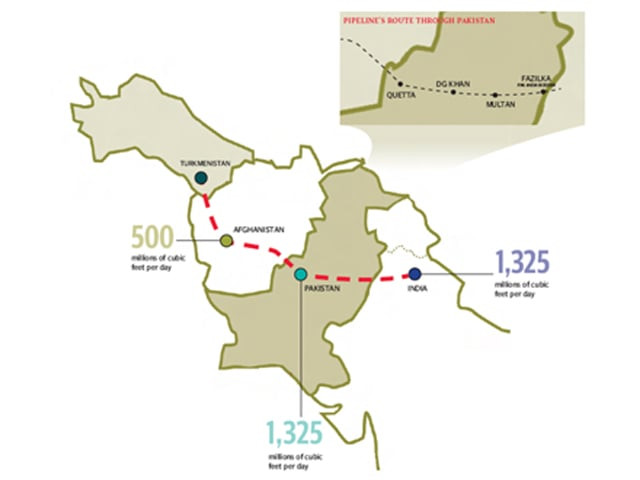TAPI: Gas reserves audit completed
Federal minister reveals details of gas pipeline agreement.

TAPI: Gas reserves audit completed
Addressing media here on Monday, Federal Minister for Petroleum and Natural Resources Naveed Qamar said that “Gaffney Cline Associates, an international energy consultant firm, has completed the gas reserve audit for the fields in South Yolotan province as well as in the Usman gas field in Turkmenistan and allotted gas certifications for these fields,” adding that the ADB-backed certification has been shared with all member countries.
According to the audit, Turkmenistan’s gas reserves from these fields stand at between 4 and 14 trillion cubic metres.
Qamar explained that earlier, the source of gas for the Tapi pipeline was supposed to be from fields in Daulatabad, Turkmenistan but plans had to be changed because the relevant certification was not received for this source. The minister asserted that “recent discoveries of gas in the South Yolotan province and in the Usman gas field are more secure and will be better able to meet the demand of this project.”
Two separate agreements were signed between member countries on Saturday in Ashgabad. Under the gas pipeline framework agreement, it has been agreed that Pakistan and India will each receive 1,325 million cubic feet per day (mmcfd) of gas, while Afghanistan will receive 500 mmcfd. According to the deal, the pipeline will have a diameter of 56 inches and will stretch over a distance of 1,640 kilometres from Turkmenistan to Fazilka in India.
The initial cost of the project was estimated to be about $3.3 billion, according to a survey conducted by UK-based Penspen. However, the same company has revised its estimateto $7.6 billion following the inclusion of India in the agreement. The pipeline is expected to commence gas flow by 2015.
Under the inter-governmental agreement, political commitments regarding the completion of the pipeline and its operations have been made. “The Afghanistan government has guaranteed that it will deploy at least 5,000 troops for the protection of the pipeline within its territory,” explained Qamar.
He added that the countries will formulate a comprehensive policies and commit resources for the security of the infrastructure.
Following these agreements, the member countries are expected to engage the services of a transaction adviser firm that will help in the preparation of marketing documents and for the development of a strategy to attract potential investors to the project, as well as prospecting the lead investor and project developer. “The pipeline will be built and run by a private consortium and several international companies, including some from the US and China who have already shown interest in entering this project,” said the minister.
The ADB has estimated that the assignment of developers will take 12 to 18 months to complete and cost $3 to $5 million. It has proposed to fund 30 per cent of this cost while the remaining 70 per cent will be funded by the buyers.
Representatives of all four countries are expected to hold three meetings to finalise the gas sale-purchase agreements by April 30, 2011. “There will be three separate bilateral agreements between Turkmenistan and each of the three recipient countries, including Pakistan,” said Qamar.
Regarding the tariff rate, Qamar said, “it is too early to comment on the rate but it will take into consideration other international gas deals and will not be simply benchmarked with the Iran-Pakistan gas pipeline deal.”
He explained that two separate tariffs will be negotiated by recipient countries, one with Turkmenistan and another with the private consortium that will build and operate the pipeline.
“This agreement is not a substitute for the Iran-Pakistan (IP) gas pipeline which is expected to provide 700 mmcfd of gas to the country; rather, it is supplemental to that deal,” said Qamar, stressing that the country’s growing energy needs cannot be met from a single source.
Qamar said that the IP pipeline project is “on schedule and is ahead of the Tapi agreement in terms of progress.” He also highlighted government efforts in encouraging the exploration of local reserves of gas, coal and oil expressing hope that “Thar coal will become a major source of energy for the country.”
When asked whether the government has sought approval from other political parties for the Tapi project, Qamar said that “the issue will be presented before parliament at an appropriate time.” He added that “no political force will oppose plans that will help the country meet its energy needs.”
Published in The Express Tribune, December 14th, 2010.


















COMMENTS
Comments are moderated and generally will be posted if they are on-topic and not abusive.
For more information, please see our Comments FAQ